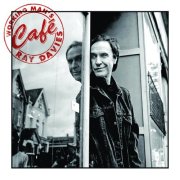 With the temperature dropping, it's time to find someone to keep you warm. Find your hookups with our online dating guide!
With the temperature dropping, it's time to find someone to keep you warm. Find your hookups with our online dating guide!
Working Man’s Café
- Rock/Pop
- 2008
- Buy the CD
Reviewed by Taylor Long
()
It isn’t that Davies has lost his talent; he's lost his individuality. Not only does he sing about the same things that his peers do, he sings about them in the same way. He's coping with his increasing age, afraid of being replaced, intimidated by technology and singing about love like someone who’s lived with it long enough to be bored by it.
Some of his grey-haired moments test credulity enough to be truly laughable. In “No One Listen,” he dares to declare that no one listens to him – which is a bold statement from someone famous enough to get an automatic four stars from Rolling Stone. He ends the album on his worst note, though, with “The Real World,” a cookie-cutter song that asks, “Where is the real world?” Apparently it’s gone missing, and it took Davies’ gumption along with it.
There are hints here of what Davies was -- and could still be. "You're Asking Me" is such a throwback that it verges on sounding too retro, but luckily never gets there, and instead shows that he hasn't lost his pop sensibilities. Though it's a little boring musically, the title track captures Davies' modern day issues acutely enough to make them more compelling than they are on the rest of the album. A wise choice for the record's namesake, it serves as his thesis, showcasing his insecurities in a world that's constantly changing. "We all seem to pass our time of day / online at the internet café," he cries, before labeling himself as "the kid with the greasy spoon / firmly held in my hand."
He might be a "kid" in his own eyes, but to outside ears he sounds like an aging rocker who's lost his sense of experimentation. It could be unfair to expect him to keep his edge, but it's not unrealistic to hope that he could retain his eloquence. There's little on Working Man's Café that implies that Davies is interested in exploring or utilizing his age and its presumably attendant wisdom; instead, he wants to hide behind it and defend it. He can hardly be blamed for that with the way his profession values and exalts youth, but it's sad that someone so previously audacious as Davies succumbed so easily.
You can follow us on Twitter and Facebook for content updates. Also, sign up for our email list for weekly updates and check us out on Google+ as well.











